|

PUBLISHED WEEKLY BY AND FOR U.S. MARINES IN CHINA |
|
VOL. 1. No. 2. (New Series) NOVEMBER 17, 1945 TIENTSIN, CHINA.
|
History:
‘First’ Has Outstanding
Battle Record
When elements of the First Marine Division began landing operations in the Tientsin-Peiping area of North China a little more than a month ago, it marked the first peaceful landing made by this outfit during the Pacific war.
After more than three years of blasting Japs out of foxholes and pillboxes, from beaches and ridges, Major General Dewitt Peck's famed division had come to reap the harvest. It was to assist in the disarmament of Japanese forces in North China.
The operation was initiated at 1100, October 1, 1945 when combat teams of the First, Seventh and Eleventh Corps in full combat dress began disembarking at the port town of Taku at the mouth of the Hai River. Other units of the Seventh Marines seized the all-weather port of Chinwangtao, 130 miles to the north, while the bulk of the 5th Marines occupied its assigned areas in the city of Peiping by October 10.
Joel D. Thacker, historian of the United States Marine Corps, in his "History of the First Division" which appeared in the September 15 edition of "Leatherneck," tells how the First Division was born. It came into existence on February 1, 1941 by change of designation from the First Marine Brigade.
At that time the brigade was under the command of Brigadier General Holland M. Smith, and was composed of the Fifth Regiment; the First Battalion, 10th Regimant, and the First Marine Aircraft Group.
When the Japanese made their treacherous attack on Pearl Harbor on December 7, 1941, the First Division consisted of 518 officers and 6,871 enlisted men. Spurred on by the need of American fighting men in the Pacific, the Division had increased its strength to 577 officers and 11,753 enlisted men by July 31, 1942. Meanwhile General Torrey turned over his command to Major General A. A. Vandegrift on March 23, 1942.
In mid-April came the first intelligence of a plan for the establishment of the SoPacAmphFor (The "Lone Wolf" plan). The plan called for early transfer of the division (minus the Seventh Marines reinforced) to New Zealand.
At that time it was estimated that the division would not see action before January 1, 1943.
Just 12 days after the first echelon arrived in New Zealand the division commander was informed of a plan for an offensive operation in the South Pacific. It was indicated that the First Marine Division would draw the attack assignment. They were to be reinforced according to the plan, by the Second Regiment of the Second Division, First Raider Battalion, and the Third Defense Battalion.
Beginning at 0740, August 7, the First Marine Division (reinforced) opened America's offensive against Japan under command of General Vandegrift. Marines went ashore on the north coast of Guadalcanal and on the smaller islands of Florida, Tulagi, Gavutu and Tanambogo.
Gen. Vandegrift was in personal command of the forces landing on Guadalcanal while the assistant division commander, Brigadier General William H. Rupertus, was in general command of the landings on the smaller islands.
By the end of the first day, beachheads had been established on all of these islands with the exception of Tanambogo. A small American flag was hoisted at Kokum on Guadalcanal - the first marker on the long road back to Tokyo.
It soon became apparent that the First Division was going to see some "rugged duty" on Guadalcanal. Shortly after the beachheads were firmly established, it became necessary to withdraw the carrier-borne air support -- the flattops were operating close to Jap-controlled waters and were in grave danger.
When the carriers shoved off the Marines were left without air support except for the little coverage provided by long range patrol and bomber planes.
There were no troop reserves in the Southwest Pacific with which to reinforce Marines in the Solomons. No land based aviation was available and the night battle off Savo Island in which the Allies lost four heavy cruisers and suffered heavy damage to a number of other vessels, had eliminated any possibility of immediate naval support.
Without air or sea protection the transports and supply ships were forced to flee to safer waters, and when the japanese began moving fleet units toward Guadalcanal, our carriers and naval forces moved out to intercept. Our planes gained an early advantage in the fight by putting two enemy carriers out of action. Our fliers practically wiped out four Jap air groups. The Battle of Santa Cruz turned out to be a battle of carriers and definitely broke up Jap attempts to bombard Guadalcanal.
The "First" had won it's spurs in battle. On December 9, 1942, after four months of continuous fighting, the division was relieved by U.S. Army troops and units of the Second Marine Division.

|
The First Marine Division, reinforced, received the Presidentail Unit Citation for the campaign.
On July 8, 1943, General Vandegrift turned over command of the division to General Rupertus.
Following the Cape Gloucester campaign, which was initiated on December 26, 1943, when Marines stormed ashore on the western end of New Britain, the "First" in the wake of a lengthy naval and air bombardment on September 15, 1944, hit the beach at Peleliu.
By nightfall of the second day, the Peleliu airfield was in the hands of the First Division, and Marines were in position to assault high ground to the front.
By September 26, the Jap defenders on Peleliu had begun to crumble under the terrific pressure applied by our troops. "Old Glory" was raised in front of the Firsat Division command post at 0800, September 27. This was official confirmation of the fact that the situation on Peleliu was "well in hand."
At 0830 on April 1, 1945, the First and Sixth Marine Divisions, III Amphibious Corps and the 24th Army Corps, which made up the newly organized Tenth American Army, began landing on the western coast of Okinawa, largest island of the Ryukyu island group.
The invasion of Okinawa, the strongest link in the Ryukyu chain that joins Formosa and the Japanese home islands, marked the end of the "island hopping" drive against Japan, which began at Guadalcanal on August 7, 1942.
Okinawa was declared officially secured 32 days after the initial landing on Easter Sunday. It brought to a close one of the fiercest campaigns of the Pacific, and signified the end of Japanese resistance.
Premier Suzuki's statement, that with the fall of Okinawa the Japanese Empire was doomed, became prophetic. - Victor I. Bumagin.
Here ‘Tis
Gen. Rockey Replies To The Question
There's a lot of scuttlebutt about when Marines in North China will leave for home, and in order to clarify these rumors, the NORTH CHINA MARINE interviewed Major General Keller E. Rockey, commanding general of the Third Amphibious Corps.
General Rockey made it clear that he did not want this newspaper to be made a clearing-house for rumors, and then added:
"It is not in my power to say when we shall leave China. This is a decision to be made by our Government in Washington. We are here at the invitation of the Chinese government which asked us to disarm the Japanese, accept their surrender, and to supervise their repatriation to their homeland.
It is our duty to carry out orders, not to issue orders.
OI should like nothing better than to be able to give you the answer I know you and your loved ones would like to have, but I am not now in a position to supply the answer to this question. Neither am I in a position to clarify any other statements made regarding the length of time United States Marines will remain in China."
"However, I should like to assure all members of my command that when orders are received, they will be carried out as speedily as possible.
"Until that time, I urge you to pay no attention to idle rumors, and to do the task which has been assigned to you. And when the time comes, I'll rejoice with you in going home with the knowledge that we did our job, and did it well."
Meanwhile, in Washington, Secretary of War Patterson said there is no danger of U.S. troops becoming involved here, and then made this significant statement:
"The military problem in China at present ind=sofar as the U.S. is concerned is the completion of surrender, disarmament and evacuation of Japanese forces. There are still more than one million armed Japanese in the China Theater.
"Our limited force on the continent of Asia is making every practicable effort to assist forces of the Central Government of China to accomplish this mission.
"The Central Government of China, under Generalissimo Chiang kai-shek has been deeply and helpfully involved both inside and outside China in our common war against Japan.
"The government of Chiang Kai-shek is formally recognized by the Soviet Republics, by Great Britain and by the U.S. All three powers are now cooperating with Generalissimo Chiang in accomplishing disarmament and evacuation of japanese troops from China.
"United States troops in China will not be used for supression of civil strife but will protect American lives and property.
"Points in China that have been liberated will be turned over to representatives of the recognized Central Government of China.
"There is no danger of our troops becoming involved in a civil strife in China unless they are attacked, in which event we may expect American troops to react with vigor and success."
Education For The Future:
Special Services Trains Men For Important Work
By S/Sgt. Bob Clark
"Our students should take a lot of strain off the chaplain," quipped Marine Captain Thomas L. Randall of Altadena, California.
The ’42 Annapolis graduate and regular Marine officer is in North China as schoolmaster of a Special Services school.
The students are the newly-assigned Special Services men of the Third Amphibious Corps, First and Sixth Marine Divisions.
Registration at the course for 'Phib Corps and First Division men just completed in Tientsin totaled 42. Fourteen were officers, ranging from captain to second lieutenant, and 28 were enlisted, from gunnery sergeant to private. Another class is now in progress at Tsingtao for Sixth Division members.
Lieut. Colonel John H. McMillan, Special Services officer of the Third Corps, said the men selected for duty in the section were regulars or reserves, with low point totals.
"Case clinics" with one student playing the part
School Days...
 Louis Massey, as he was known for 12½ years when he fought most of the pro ring's great feather-, light-, and welter- weights, shows students of
the Special Services here how to keep a good guard. Private First Class Louis J. Masucci, as his Marine Corps record book shows him, has lent his "know how"
to the talents of an itinerant school staff in its sports instruction here. Wearing the gloves are Privates Robert L. Klute of Three Oaks, Michigan, and
Roland E. Mossberg of Route 2, Amherst, Massachusetts.
Louis Massey, as he was known for 12½ years when he fought most of the pro ring's great feather-, light-, and welter- weights, shows students of
the Special Services here how to keep a good guard. Private First Class Louis J. Masucci, as his Marine Corps record book shows him, has lent his "know how"
to the talents of an itinerant school staff in its sports instruction here. Wearing the gloves are Privates Robert L. Klute of Three Oaks, Michigan, and
Roland E. Mossberg of Route 2, Amherst, Massachusetts.
|
Recreation comes in for nine hours of study and practice; the other nine hours of the course are given to consideration of Special Services supplies and accounts, and to school administration.
Drawing on their experience in handling people in civilian life are the personal affairs instructors, First Lieutenant Charles W. Guenter of La Crosse, Wisconsin and Illinois from 1936 to June, 1942, when he entered the Marine Corps, and Staff Sergeant Douglas H. Tew of Bridgeport, Connecticut, salesman for the Holland Furnace Company.
Vocational guidance is taught by Technical Sergeant Michael Block of Brooklyn, New York, one-time civilian physicist at the Army Signal Corps General Development Laboratory, Fort Monmouth, New Jersey.
First Lieutenant Gordon W. Johnson of New Bedford, Massachucetts, for two years a Navy aviator, lectures on education.
The athletic program is under the guidance of Second Lieutenant George Hudanish, Jr., of Roselle Park, New Jersey, a gridder at Columbia and Yale, and Corporal Gerald H. Croushore of Massilon, Ohio, graduate of Bethany (West Virginia) College with a B.A. in physical education, former assistant coach and scout for the nationally known Massilon High School and physical director at the Massilon YMCA.
Second Lieutenant Robert E. Huffman of Marysville, Ohio, former personnel man at the Parker Appliance Company, Cleveland, Ohio, and onetime reporter on the Mansfield (Ohio) News-Journal, is in charge of the recreation course.
Adjutant of the school is Chief Warrant Officer David H. Dingwall of New York City.

|
Education:
Information on G.I. Rights Prepared for Marines
As the point system reaches lower levels, inquiries are being made by service personnel about the provisions of the G.I. Bill of Rights and other veteran's benefits.
The Corps Special Service Officer, Lieut. Colonel J. H. McMillan, reported that every effort is being made to acquaint Marines in this area with the latest developments on veteran's legislation.
He pointed out that most men are not aware of many of the provisions and urged that they keep in close touch with their Battalion Special Services Officer for latest developments and special information on such topics as mustering out pay, insurance, loans, schooling and pensions.
A complete information program is now being prepared to acquaint the men with all the aspects of these benefits.
|
Congratulatory Telegrams Cite USMC Birthday Major General Keller E. Rockey, Commanding General of the Marine Corps Forces in North China, received the following telegrams on the 170th anniversary of the Marine Corps. "Congratulations on One Hundred Seventieth Anniversary of American Marines" ...General Sun Lien-chung, Commander-in-Chief of the 11th War Area ...Brigadier General Hu Chung-ching, Chief of the Foreign Affairs Department, 11th War Area. "Greetings and Heartiest Wishes on Marine Birthday" ...O. Joerg, Consul for Switzerland. |
‘Complaint Box’ For Marines
Initiated Here
In order to answer any complaints that Marine Corps personnel in Tientsin may have to lodge against anything except military matters in the city, the Reception Committee for Allied Forces, Tientsin Municipal Government has instituted a "Complaint Box."
It's object is to receive complaints that Marines in Tientsin have accumulated here.
All complaints should be addressed in clear handwriting to "The Complaint Box," Reception Committee for Allied Forces, 222 Victoria Road, Ex-British Concession.
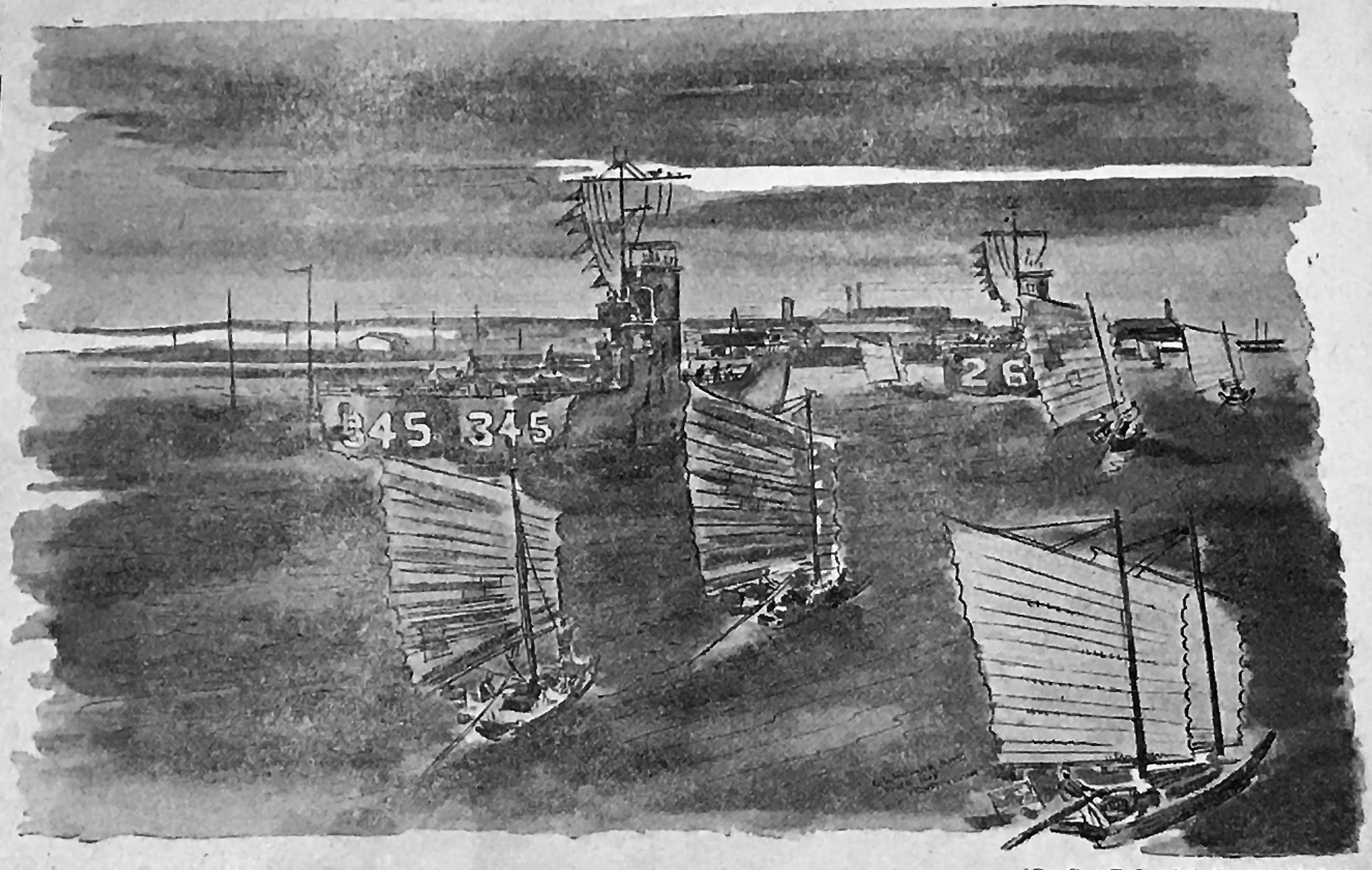
(By Sgt. Roland G. James USMCR.) |
SAILOR, FIRST CHINA CASUALTY
Boatswains Mate Second Class Floyd Carlton Roach, USN, of Sault Ste Marie, Mich., was the first American to be buried on China soil when the Sixth Marine Division arrived at Tsingtao, Shangtung Province recently.
Roach, who was 21 was killed in a freak accident aboard the USS DADE, flagship of the transport group which landed the Marines. Killed while operating a cargo winch, he was buried in the International Cemetery, Tsingtao, will full military honors.
|
Excerpts: ‘Things Chinese..’ (The following are excerpts from the Tientsin Evening Journal column by Sergeant William Martin Camp, USMC, author of "Retreat, Hell!" and "Skip to My Lou," two recent novels.) Yanks take brides wherever they go, and it is no wonder that the big problem confronting the Army and Navy transport services is the delivery of wives of American servicemen who have served on foreign shores, taken unto themselves wives and begun producing families. There have been various estimates on the number of wives of Americans waiting in the British Empire to go "home" to Daddy. Some say there must be half a million in London and the rest of the British Isles. * * * Boys, here's what we're up against: In the first place, no old line Chinese girl will go out with a foreign man in public unescorted without running the risk of being shunned by her family and friends. However, if you do manage to talk your way into the good graces of a Chinese family, we doubt whether you could meet the other requirements of a proper Chinese marriage. Chinese girls are usually betrothed in childhood, and sometimes even before they are born. It may happen that two families are particularly friendly, and the parents of expected children often agree that if one has a boy and the other a girl, they will be pledged in marriage from the moment of birth. * * * Now, how about this: A man in China marries - not so much for his own benefit but to perpetuate the family name, to provide descendants to continue this business of ancestral worship, and to give his mother a daughter to wait on her. And you can't say to the little lady, "You name the day, baby!" for that is the right of the groom's father. Now if I were to ask my old man - Well, that's another story. * * * |
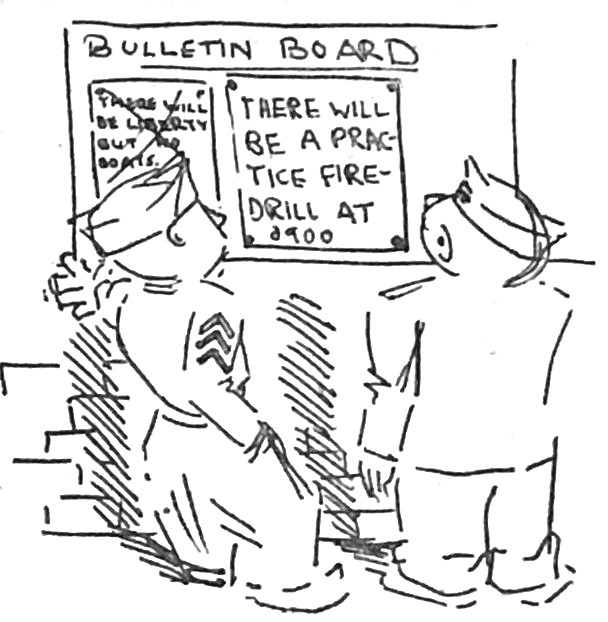
|
Marines Finally See
A ‘Chinese Fire Drill’
The First Division M.P. battalion and Headquarters Co., Seventh Service Regiment were forced to move early Saturday when fire spread through the top deck of the hall and Holtz building. The M.P. battalion is now located in the old warehouse near the McKenzie building while Headquarters Co. is billeted in the Wilson Annex.
Chimney sparks were reported as being the cause of the fire. Dry straw, used in the construction of most Chinese buildings, was found in the remnants of the burned sections. Most of the damage caused by the fire was confined to the top deck, however water damage was extensive. A complete estimate of the total loss sustained has not been made available as yet.
The Tientsin fire department was called to the scene at 0840 and left at 1030; the regimental department was summoned at 0920 and stayed until 1100.
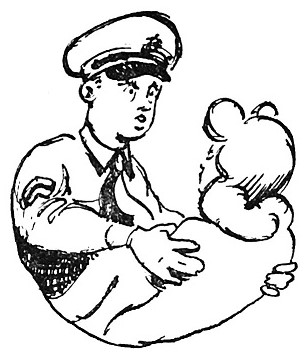
|
IN THE 1ST ROW
THIS MARINE
STOPS THE SHOW
Marine Private First Class Donald McRae, a 20-year-old cowboy from Miles City, Montana, "stopped the show" in Tongshan soon after the Marines landed, according to a story by PFC John Murphy of the Tulsa World.
McRae and his buddies attended a Chinese theater one night in Tongshan, and he managed to smile and squirm his way through the entire 6-hour performance - long after his buddies had shoved off.
After six hours, one of the actors got up on the stage, pointed to McRae and said in Chinese:
"We can't get anything done up here. The heroine is too busy looking at the Marine in the first row."
McRae blushed, the audience howled, but the show went on.
NEVER TOO OLD, THEY TELL US
Bill "lefty" Haerde, Galesburg, Ill., furnishes absolute proof that football competition is not limited strictly to teenagers. At 32, he is captain and star player of the Knox College grid tream.
After service with the Marines on Guadalcanal, Guam and Iwo Jima, Haerde "surveyed" his M-1 for a pigskin and "volunteered" for duty at Knox. It is understood he didn't require much snapping in this season because he took his "boot" training on the gridirons of a Moline, Ill., high school.
We're wondering if some of the young ex-grid stars who are doing duty here in China now will be able to get "back in the game" as easily as Haerde.
Radio Stations XBOR, XABU On The Air
The Marine Corps anniversary on November 10 marked the beginning of broadcast operations for two radio stations established to serve Marines in the North China area with stateside radio entertainment.
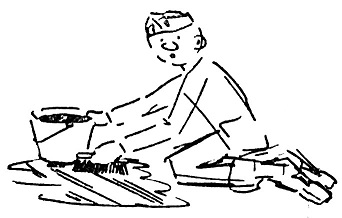
|
With the first few days of broadcasting devoted to signal testing and eliminating "bugs" in transmission, Station XBOR, Tientsin and Station XABU, Tsingtao, were preparing to launch into a full schedule of Armed Forces Radio Service programs by the end of this week.
Up to the minute news reports as well as musical and variety programs will be included in the schedules of both stations. Plans called for at least six hours of broadcasting each week day, starting at Sunday when the sign-on will be at 1200.
Station XABU will be heard by men in Tsingtao on 1480 kc, while Troops stationed in Tientsin will dial Station XBOR at 1500 kc.
Night Life In Tientsin ...
‘What A Town,’ Says Sidetracked Snooper
How does the average Marine spend his liberties in Tientsin? Where does he go - what does he do - and how does he do it? I was told an answer to each one of those questions was worth $64, American gold.
Equipped with a combat pack containing my portable typewriter, camp stool, one ream of typing paper, one dozen pencils, an extra set of greens, one pair of field shoes and my liberty pass, I placed myself in a camouflaged spot, ready to ambush the first liberty hound who appeared. That was the slickest maneuver I ever pulled - even in combat. I hadn't waited more than two minutes until a well shined, pressed and greased corporal swished past with "liberty" glowing all over him - accentuated by neon signs.
Grinding into high gear, I tore after him for two blocks, counting "Wan, op, thrip" all the way so I wouldn't get out of step. Just as I was ready to either take a ten minute break or drop my combat pack, the corporal executed a snappy Column Right - March into a doorway and vaulted two flights of stairs. Since I was so anxious to keep contact with him, I did something that I have never done during all the time I have been a Marine. I "fluffed off" because I failed to execute my column rightmovement in a military manner.
Instead, I cut the corner and forgot to hold my pivot - something which would have mortified my D.I. at P.I. But the 320,000 FRB's were itching my palm, so I wasn't about to lose track of my man, regardless of Infantry Drill Regulations.
As soon as I had labored up the steps I located
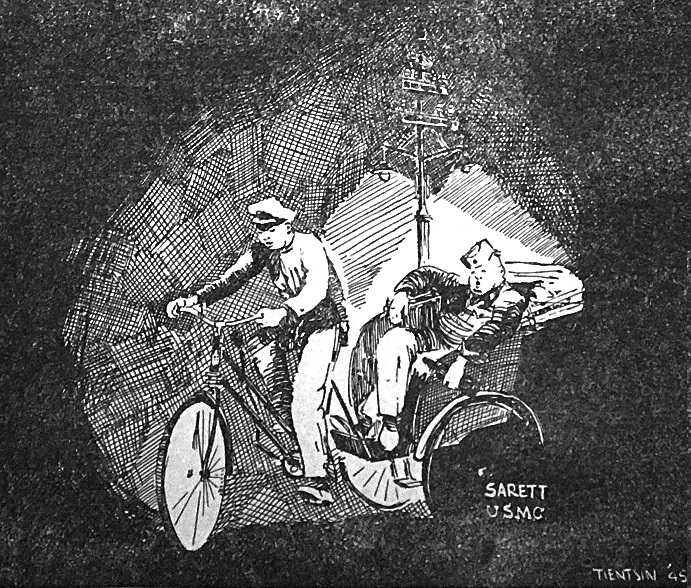
|
Twenty minutes later the barkeep gingerly placed a tiny glass of white liquid before me which looked exactly like water.
As soon as the drink hit bottom my ears lit up and glowed red, my hair stood at attention, and my eyes counted more stars than Carters' have pills.
It was hours later before the bartender could arouse me by soaking my head under a cold water faucet.
Don't ask me what became of the corporal I was trailing. Don't ask me if I found out where Marines pitch their liberties in Tientsin. And above all, don't ask me if I collected my $64 American gold for the answers I didn't get. Just let me alone while I ease my aching head.
If I recover, I'll try again next week.
STATESIDE MUSICAL VARIETY SHOW SCHEDULED HERE
A stateside musical variety show, featuring girls, gags, magicians, jugglers, and a 12 piece swing band will be presented at the Red Cross Club No. 1 on Woodrow Wilson Road on November 19, 20, 21, and at the Astoria Theater on November 23.
Tickets may be obtained for the Tuesday, Wednesday, and Friday shows at either Red Cross Club, Post Exchange restaurant, service clubs and from Special Services Officers. Open House on Monday, November 19.
Curtain time for all performances is 2000.
MAJOR GENERAL KELLER E. ROCKEY, USMC, Commanding General; LIEUTENANT COLONEL J. H. McMILLAN, USMCR, Special Services Officer; 2ND LIEUTENANT R. D. LYONS, USMCR, Officer-in-Charge; Sgt. WILLIAM MARTIN CAMP, Editorial Advisor; Corp. VICTOR I. BUMAGIN, Managing editor. STAFF: Corp. William J. Mangum, Sports; Pvt. Jack Sloan, Corp. Edward Daily, Corp. William F. Hart, Circulation Advisor. CONTRIBUTORS: S/Sgt. Norris Anderson, Sgt. Roland G. James, S/Sgt. Wayne F. Young, Sgt. John O. Davies, Jr., Corp. Arthur Sarett, Corp. Fred Travis.
PUBLICATION OF THIS NEWSPAPER IS IN COMPLIANCE WITH LETTER OF INSTRUCTION NO. 1100, COMMANDANT, HQS. U.S. MARINE CORPS, WASHINGTON, D.C. PUBLISHED WEEKLY BY THE THIRD AMPHIBIOUS CORPS AT THE CHIHLI PRESS, TIENTSIN, CHINA, WITH FUNDS OF THE SPECIAL SERVICE SECTION. NO PAID ADVERTISEMENTS ACCEPTED. CONTRIBUTIONS BY MARINES WELCOME. ADDRESS COMMUNICATIONS TO THE EDITOR, THE NORTH CHINA MARINE, SPECIAL SERVICES OFFICE, THIRD AMPHIBIOUS CORPS, FMF., C/O FPO, SAN FRANCISCO, CALIF. 10,000 COPIES THIS ISSUE.

NOVEMBER 17, 1945
Original issue of THE NORTH CHINA MARINE shared by Jeff Titchenal
Copyright © 2017 Carl Warren Weidenburner
TOP OF PAGE ABOUT THIS PAGE E-MAIL YOUR COMMENTS CLOSE THIS WINDOW

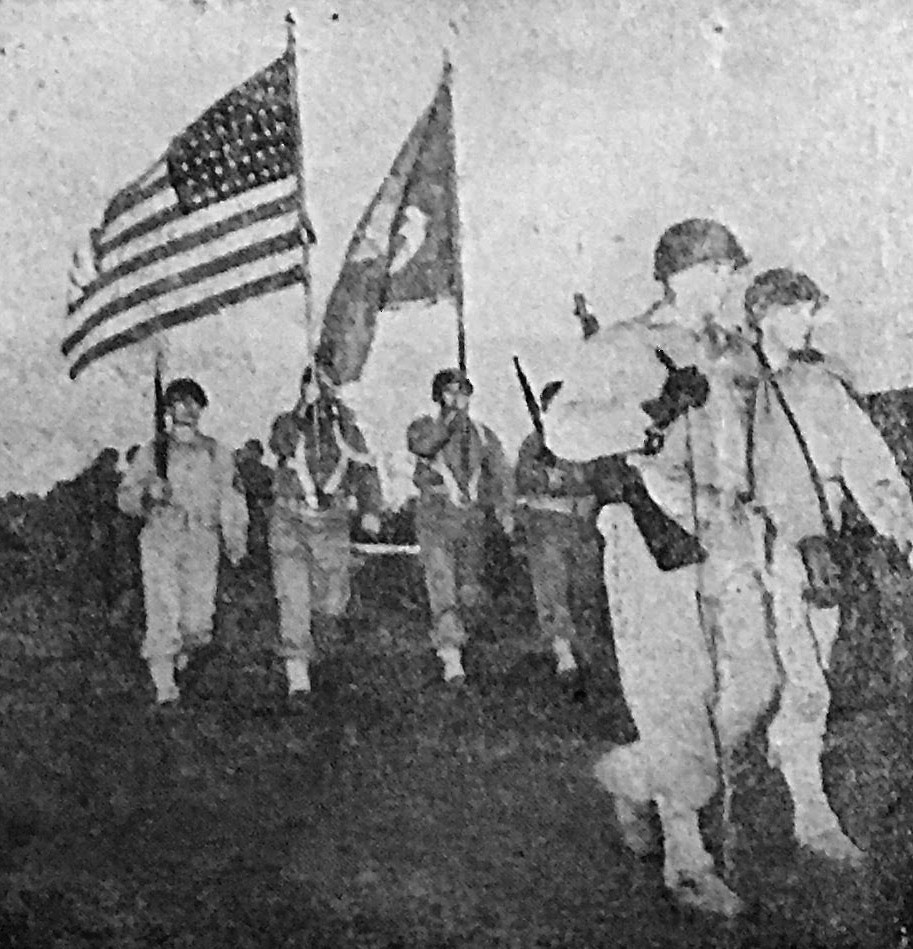 Units of the First Marine Division parade in Tientsin on anniversary of Marine Corps' 170th birthday.
Troops were led by Major General Keller E. Rockey, Commanding III Amphibious Corps and General Dewitt Peck, First Division commander.
Units of the First Marine Division parade in Tientsin on anniversary of Marine Corps' 170th birthday.
Troops were led by Major General Keller E. Rockey, Commanding III Amphibious Corps and General Dewitt Peck, First Division commander.
 From Guadalcanal to Okinawa, units of the "First" flushed snipers from caves, similar to this. Many Marine lives were lost on numerous battlefields
in this manner. - Photo by Al Giossi
From Guadalcanal to Okinawa, units of the "First" flushed snipers from caves, similar to this. Many Marine lives were lost on numerous battlefields
in this manner. - Photo by Al Giossi
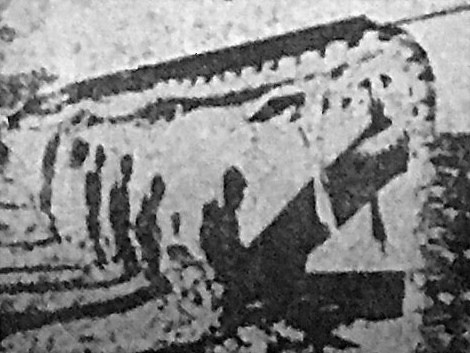 Shadows of the First Division patrol fall across tank as men pushed toward conquest of Okinawa. - Photo by Al Giossi
Shadows of the First Division patrol fall across tank as men pushed toward conquest of Okinawa. - Photo by Al Giossi